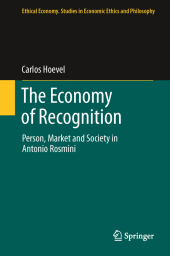 Neuerscheinungen 2015Stand: 2020-02-01 |
Schnellsuche
ISBN/Stichwort/Autor
|
Herderstra▀e 10
10625 Berlin
Tel.: 030 315 714 16
Fax 030 315 714 14
info@buchspektrum.de |

Carlos Hoevel
The Economy of Recognition
Person, Market and Society in Antonio Rosmini
2013. 2015. xv, 263 S. 235 mm
Verlag/Jahr: SPRINGER NETHERLANDS; SPRINGER 2015
ISBN: 9401781141 (9401781141)
Neue ISBN: 978-9401781145 (9789401781145)
Preis und Lieferzeit: Bitte klicken
Bringing an alternative philosophical foundation to the study of economics, this book explores the views of Antonio Rosmini (1797-1855), whose interpretation of economic action was fundamentally at odds with today┤s prevailing, all-conquering utilitarianism.
Introducing an alternative philosophical foundation to the study of economics, this book explains and adopts the perspective of the Italian philosopher Antonio Rosmini (1797-1855), whose interpretation of economic action was fundamentally at odds with the prevailing and all-conquering utilitarianism of modernity. Rosmini, one of the most important Italian and Catholic philosophers of the modern age, eschewed the traditional concepts of subjectivism and individualism at the core of the utilitarian thesis, prefiguring today┤s critique of ┤autistic economics┤ with his assertion that micro-economic formulae consecrating the ┤maximization of utility┤ derive not from scientific principles or even hypotheses, but from uncritically adopted philosophical ideas. It was an assault on the determinism he perceived as the fatal flaw in accepted economic theory. Rosmini┤s notion of human and economic action, based on human beings┤ ┤personal┤ capacities for objective knowledge, truth recognition, moral goodness and happiness, deeply transform the meaning of central economic activities such as labour, wealth creation and consumption, and become crucial factors in any analysis of the operation of the economy. After introducing the fundamentals of Rosmini┤s thought, the author details the theoretical and institutional features of utilitarian economics, tracing their influence on social norms. He juxtaposes these with Rosmini┤s alternative philosophy which places the concept of social justice at its heart, and which attempts to establish a framework for relations between the public and private realms. The contemporary case is then made for adopting Rosmini┤s principles, thus changing an economic paradigm widely held to be unassailable. The fruit of unprecedented and systematic research on Rosmini┤s economic ideas, this volume offers a detailed conceptual framework to guide alternative approaches to conventional neoclassical economics._
Contents.- Acknowledgement.- 1. Introduction: From Autism To Recognition.- 2. A Philosopher In Search For The Economy.- 3. The Utilitarian Paradigm.- 4. Recognizing The Truth: Human Action Beyond Utilitarianism.- 5. Economic Action, Happiness And Personalized Self-Interest.- 6. Rethinking Labor, Wealth And Consumption.- 7. Recognizing The Other: Rights And Ethics In Market Relations.- 8. A Critique Of Political Utilitarianism.- 9. Paths Towards Social Recognition.- 10. Instruments Of Economic Policy Under The Light.- 11. State Institutions, Civil Society, Family And Religion.- 12 Conclusion: Towards A New Economic Science.- Bibliography.- Index.
"Hoevel is a serious scholar and immersed himself deeply in his subject matter. He masters Rosmini┤s writings, and presents them with affection and respect. His book will certainly become a point of reference in the secondary literature on Rosmini, and rightly so." (Alberto Mingardi, Journal of Markets & Morality, Vol. 18 (1), 2015)
"The analysis of Hoevel is ... the most complete study on the economic thought of Antonio Rosmini. ... I would like to thank him for the precious considerations he has given not only to Rosminian research but also to the philosophical and economical discussion on the future of our economic system ... . The study of Hoevel has stimulated my ideas on Rosmini, and ... it will be the same to many readers, which this book merits without any doubt." (Markus Krienke, History of Economic Thought and Policy, Issue 1, 2014)


